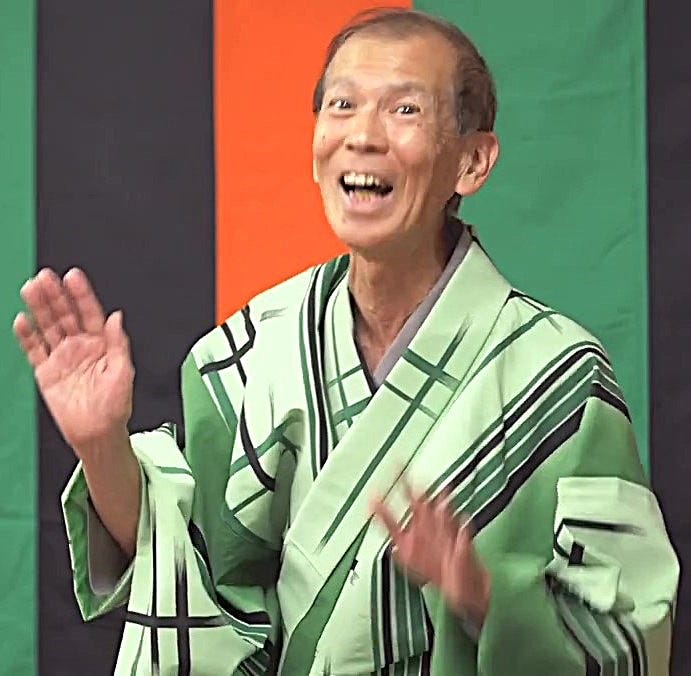The Importance of Humor
Learn about 落語 Rakugo, Traditional Japanese Comic Storytelling
Humor is very important in life. It helps people feel happy and relaxed. When we laugh, we feel less stress. Humor can also help people become friends. We can share jokes and stories with others.
In Japan, there is a funny kind of storytelling called Rakugo. In Rakugo, one person tells a funny story while sitting down. They use different voices and faces for each character. It is a very old tradition, but people still enjoy it today.
Humor, like Rakugo, brings joy to our hearts and helps us understand each other, even if we speak different languages.
“Laughter is the best medicine.”
The phrase “Laughter is the best medicine” can be translated into Japanese as:
笑いは最高の薬です。
(Warai wa saikō no kusuri desu.)
Listen to the accompanying podcast to follow along with the text.
Here is a bilingual English–Japanese vocabulary list with definitions for key words in the essay:
Vocabulary List
English and Japanese
Definition (English)
意味(日本語)
Humor
ユーモア
The quality of being funny or making people laugh
人を笑わせる面白さ
Important
大切な / 重要な
Something that matters a lot; needed
とても大事なこと
Laugh
笑う(わらう)
To make a happy sound when something is funny
面白いときに出る音、笑うこと
Relaxed
リラックスした
Feeling calm and not worried
落ち着いている、安心している
Stress
ストレス
A feeling of worry or pressure
心のプレッシャーや緊張
Friend(s)
友達(ともだち)
People you like and spend time with
仲のよい人、友達
Joke(s)
冗談(じょうだん)
Something said to make people laugh
人を笑わせる言葉や話
Story(ies)
話(はなし)
A telling of something that happened or imagined
出来事や想像を伝えるもの
Rakugo
落語(らくご)
A traditional Japanese funny storytelling performance
日本の伝統的な一人語りの笑い話
Voice(s)
声(こえ)
The sound we make when we speak
人が話すときの音
Character(s)
登場人物(とうじょうじんぶつ)
The people in a story
お話に出てくる人やキャラクター
Joy
喜び(よろこび)
A feeling of great happiness
とても嬉しい気持ち
Understand
理解する(りかいする)
To know what something means
意味や気持ちがわかること
Language(s)
言語(げんご)
A system of words used to talk
話すためのことばのシステム
Let me know if you’d like printable flashcards or a worksheet based on this!
Comedy Vocabulary List / コメディー語彙リスト
General Comedy Terms / 一般的なコメディー用語
English and Japanese (Kanji / Kana)
Definition (English)
定義(日本語)
Comedy
喜劇(きげき)
A funny performance or story that makes people laugh.
人を笑わせるための面白いパフォーマンスや話。
Joke
冗談(じょうだん)
Something said to make people laugh.
人を笑わせるために言うこと。
Laugh
笑う(わらう)
To show happiness by smiling and making sound.
楽しいときに笑顔になって音を出すこと。
Comedian
コメディアン
A person who tells jokes or acts in a funny way.
冗談を言ったり面白い演技をする人。
Funny
面白い(おもしろい)
Something that makes you laugh.
笑わせるようなこと。
Humor
ユーモア
The quality of being funny.
面白さや笑わせる力。
Story
話(はなし)
A description of events told to others.
誰かに語る出来事の説明。
Punchline
オチ
The funny or surprising end of a joke.
冗談の最後の面白い部分。
Audience
観客(かんきゃく)
People who watch or listen to a performance.
パフォーマンスを見る人たち。
Traditional Rakugo Comedy Terms / 伝統的な落語の用語
English and Japanese (Kanji / Kana)
Definition (English)
定義(日本語)
Rakugo
落語(らくご)
Traditional Japanese comedy storytelling.
一人で話す日本の伝統的なコメディー。
Storyteller
落語家(らくごか)
A performer who tells Rakugo stories.
落語を話すパフォーマー。
Folding fan
扇子(せんす)
A fan used as a prop in Rakugo.
落語で使う小道具の一つ。
Small cloth
手ぬぐい(てぬぐい)
A cloth used as a prop, like a towel or napkin.
小道具として使われる布。
Sitting position
正座(せいざ)
A kneeling way of sitting used during Rakugo.
落語で使われる正式な座り方。
Monologue
一人語り(ひとりがたり)
One person telling a story alone.
一人で物語を話すこと。
Character switching
役の切り替え(やくのきりかえ)
Changing voice and face to act as different characters.
別の登場人物として声や表情を変えること。
Edo Period
江戸時代(えどじだい)
A historical period in Japan when Rakugo became popular.
落語が人気になった日本の歴史時代。
Traditional story
古典落語(こてんらくご)
A classic Rakugo story passed down over time.
長い間伝えられてきた落語の話。
Modern Rakugo
新作落語(しんさくらくご)
A new, original Rakugo story.
新しく作られた落語の話。
Example Phrases / 例文
This comedian is very funny!
このコメディアンはとても面白いです!
(Kono komedian wa totemo omoshiroi desu!)I laughed a lot at the Rakugo story.
落語の話でたくさん笑いました。
(Rakugo no hanashi de takusan waraimashita.)The punchline was surprising and hilarious.
オチがびっくりして、すごく笑えました。
(Ochi ga bikkuri shite, sugoku waraemashita.)




